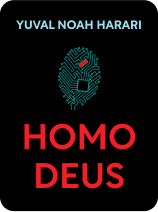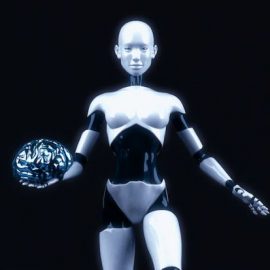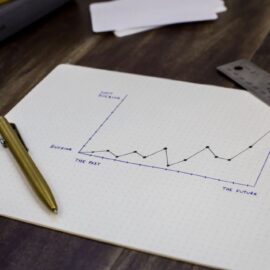

This article is an excerpt from the Shortform book guide to "Homo Deus" by Yuval Noah Harari. Shortform has the world's best summaries and analyses of books you should be reading.
Like this article? Sign up for a free trial here .
Are we witnessing the death of liberalism? Why is liberalism becoming irrelevant as technology advances?
According to Yuval Noah Harari, an Israeli intellectual and the author of Homo Deus, advances in technology might make liberalism a thing of the past. He predicts the death of liberalism to be the result of three potential developments: 1) the loss of military and economic usefulness, 2) the rise of decision-making algorithms, and 3) the creation of the “superhuman.”
Read about the projected death of liberalism.
Are We Witnessing the Death of Liberalism?
According to Yuval Noah Harari, the author of The New York Times bestsellers Homo Sapiens and Homo Deus, the 21st century will likely see the death of the dominant ideology of the previous century—liberalism. As the concepts of free will and individualism continue to be challenged, three potential developments could wipe out liberalism in the 21st century:
- The loss of military and economic usefulness
- The rise of decision-making algorithms
- The creation of the “superhuman”
1) The Loss of Military and Economic Usefulness
The first potential development predicts that technology will make humans unnecessary to the economy and military, leading political and economic systems to devalue the human perspective. Liberalism rose to prominence because the political, economic, and military systems relied on the masses to keep them afloat. If a nation wanted to go to war, they needed foot soldiers. If industrialists wanted to open a factory, they needed floor workers.
Defenders of liberalism point to the effectiveness of soldiers and workers as a selling point for the liberal system, explaining that, when people feel valued, they work harder and more efficiently. In the 20th century, because political and economic systems relied on large numbers of people to operate, it made sense to value the perspectives of all people to boost productivity.
However, in the 21st century, technological advancements have started to replace human beings within economic and military models. Today, one drone specialist can do the job of a team of soldiers, and a mechanical arm can work the assembly line without tiring. Because of this, the common person won’t have as much to contribute to economic and political systems.
Technology even threatens specialized positions as new developments have started to separate intelligence from consciousness. Where organizations once had to rely on conscious human beings to make decisions, artificial intelligence programs now have complex algorithms to guide decision-making processes. These algorithms remove the variable of human emotion and lead to calculated, but detached choices.
Intelligence Versus Consciousness
In the coming years, humanity will have to grapple with the following question: Which does humanity value more—intelligence or consciousness?
For example, if we banned all human drivers and made all cars autonomous, all cars could be interlinked to a central system, removing human error from the equation. While this would make the journey safer and more effective, this would eliminate the human experience of driving a car, limit individual freedom, and eliminate the jobs of millions of taxi and bus drivers. What does society value more—the experiences of individual drivers or the efficiency of autonomous vehicles?
We have already started to give power to autonomous systems. For example, modern stock trading is run primarily by computer run algorithms. While these algorithms process more data in a second than people could process in a year, they’re also susceptible to cyberattacks.
In April 2013, Syrian hackers used the Associated Press’s Twitter account to spread a false message saying that President Obama had been hurt in an attack on the White House. Trade algorithms processed this information and started aggressively selling stocks, leading to the Dow Jones dropping 150 points, the equivalent of $136 billion. Thankfully, the Associated Press clarified that they’d been hacked, and the algorithms bought back the stocks, allowing the market to recover within mere minutes of the initial cyberattack.
In the future, these systems may even take over the jobs of lawyers, doctors, and teachers. The technology is already well on its way. For example, IBM’s artificial intelligence, Watson, has been created to diagnose diseases based on patient information and observation. Watson has multiple advantages over human doctors:
- Watson can hold information in its database about every illness and medicine known to mankind. It can update this information with real-time data from hospitals and studies conducted globally.
- Watson can study the entire genome and medical history of both a patient and their relatives. It can use this information to determine if a patient is genetically predisposed to certain illnesses.
- Watson removes the risk of human error and can work nonstop.
The Result of Automation
While technology changed industries in the past, the industries still required human workers. For example, while the Industrial Revolution disrupted the agricultural industry with the development of new technologies, factories still needed people to operate and maintain the new machinery.
However, technological automation in the modern era poses an unprecedented threat. If replaced by artificial intelligence or mechanical systems, people won’t be able to find new employment because the need for human workers will be at an all-time low.
While human beings currently possess the ability to do things computers can’t, artificial intelligence is developing at an explosive pace. For example, in the early 2000s, experts pointed to facial recognition as an example of the superiority of human intelligence when compared to computers. Today, facial recognition algorithms can scan through thousands of faces in minutes.
Artificial intelligence programs are even teaching themselves new information without the guidance of their creators. For example, in 2015, Google Deep-Mind taught itself how to play almost 50 different games. After coding the program, developers simply put the games in front of Deep-Mind and let it figure out how to play by itself. It can now play most of the games better than humans, implementing strategies most people would never think of.
As humans are replaced by machines, the distribution of wealth will become even more unequal. The elite will make more income thanks to more efficient production and lower employee costs, and technology developers will make money building machines, forming algorithms, and maintaining machines. The common worker, however, will be left with nothing to hold onto.
As workers lose economic opportunities, they’ll also lose political relevance. While workers can presently unionize and strike to make their voices heard, if they’re replaced with machines, their ability to voice their opinion will be eliminated. If a worker demands more pay or better working conditions, a corporation can replace the worker with a machine that doesn’t require pay or benefits.
Eventually, algorithms could run entire corporations or businesses. For example, if an algorithm is put in charge of an investment portfolio, it may invest in real estate. This could make the algorithm, in effect, a landlord in charge of collecting rent and overseeing tenant requests. If a tenant refused to pay rent, the algorithm could immediately contact a lawyer and build a court case.
Though seen as a field requiring “human experience,” not even art is safe from the rise of algorithms. For example, a musicology professor named David Cope created an algorithm called EMI that studied the works of Bach, then created over 5,000 Bach-esque chorales. When EMI’s piece was put against an actual Bach piece and another composer’s work, audiences thought that the EMI piece was the authentic Bach piece, that the Bach piece was the other composer’s work, and that the other composer’s work was created by the computer.
If machines replace humans in political, economic, and artistic models, will the human experience have any value? Many experts argue that it won’t. In fact, some predict that intelligent computers may view people as useless and a threat to technological superiority, leading them to eradicate humanity entirely.
2) The Rise of Decision-Making Algorithms
The second potential development predicts that algorithms will one day make choices for people. Liberalism relies on individualism and the belief that humans know things about themselves that no one else can discover.
Through the 19th and 20th centuries, no amount of observation or monitoring could help researchers understand a person better than they know themselves. With a limited amount of knowledge about biochemistry and neuroscience, even the best scientists couldn’t process all of the data they were receiving. Because of this, today, most people trust in their inner voice over an external voice.
However, as technology continues to advance, researchers may be able to develop an algorithm that can process more information than the human brain, allowing the algorithm to understand people better than they know themselves. If this occurs, people will start relying on external algorithms to guide their behavior instead of their internal voices.
People have already started deferring to technology to make daily decisions. For example, some people wear watches that track their steps and recommend what to do to stay in shape. While some use this as a simple reference tool, others obsess over achieving the goals set by the algorithms.
While people currently use these algorithms for health and fitness purposes, the technology may eventually determine how people spend all of their time. For example, if you had the option to either play basketball or play chess in your free time, you’d probably do whatever your “inner self” told you to do. However, if there were an app that scanned your brain and body to determine which would be more productive, you might listen to the app instead.
Today, people have even used technology to protect themselves from potential disease. For example, actress Angelina Jolie went through a double mastectomy after genetic testing revealed that she had an 87% chance of developing breast cancer. Though she didn’t have cancer at the time, she heeded the genetic test and decided to go through the difficult procedure to alleviate the risk of developing cancer.
Sacrificing Privacy
People have to sacrifice privacy for advanced algorithms to work. On the one hand, the more information we give to external algorithms, the better those algorithms will be able to guide decision-making processes. On the other hand, people’s personal data will no longer be personal, resting in the hands of large corporations and artificial intelligence.
Today, this is seen most often in the health and wellness industry. For example, Google has started a program called Google Baseline. With this program, Google wants to create a massive database containing the health information of its users. This information will allow Google to create algorithms that can alert people about health issues they may be unaware of and guide their lifestyle choices based on their health profile. However, to obtain the information necessary for a venture like this to work, Google needs people to hand over their health data and genetic information.
If companies like Google get hold of vast amounts of biometric and genetic information, the algorithms they create will not only protect individual people from disease, but they will also help society fight and contain pandemics. Beyond healthcare, these algorithms could track people’s every word and movement, using that information to help them make decisions based upon their interactions.
Unlike the “inner voice,” which relies on partial or manipulated memories to form decisions, these algorithms would have perfect memories of interactions. With continued advances in computer learning, this could eventually allow artificial intelligence to make more thoughtful decisions than people do, as they remove subjectivity from the equation.
For example, imagine you ask an algorithm about your love life. You explain that you like both Kendra and Melody, but you can’t decide whom you should pursue. The algorithm may then respond by telling you that it’s analyzed the data based on your genetic profile, the texts you’ve sent, your heart rate, and your sexual experiences to determine that there’s a 75% chance you’ll be better off with Melody. While you may have just “relied on your inner voice” to guide you to one of your lovers, the algorithm has made a more objective analysis for you.
The Death of Liberal Democracy
If algorithms replace the “inner self,” the concept of individualism will die as everyone will see their role in a global network of data. The death of individualism will lead to the death of democracy because democracy relies on the concept that every person has a unique perspective.
For example, halfway through the incumbency of a sitting president, you may feel as though that person is incompetent and needs to be voted out. However, following a massive campaign and a few tax cuts, you may forget about your initial feelings come Election Day, leading you to vote for them to have a second term.
An algorithm, on the other hand, would factor all of your experiences into its decision-making process, using everything from your blood pressure to analysis of campaign slogans. Where human thought is fleeting and subjective, algorithmic processing is stable and objective, meaning that the algorithm would likely be able to make a more thoughtful decision than you.
Because they rely on probabilities, algorithms wouldn’t make the right decision every time. However, if they make the right decision most of the time, people will be willing to give more authority to the centralized algorithms. They don’t need algorithms to be perfect. They just need them to be better than their “inner voice.”
This isn’t a far-off fantasy. Some algorithms already know people better than their closest friends and family members do. For example, Facebook tested the power of its algorithm by asking subjects to answer a questionnaire, then asking the subject’s friends, colleagues, or family members to guess their answers.
Facebook then asked the algorithm to guess the subject’s answers based on their likes. The more likes a person had clicked, the more accurate the predictions were. Facebook then pitted the algorithm’s answers against the answers of those closest to the subject to see which was more accurate.
On average, the study revealed that the algorithm only needed 70 likes to be more accurate than friends, 150 likes to be more accurate than family, and 300 likes to be more accurate than spouses. Essentially, if you’ve liked 300 or more things on Facebook, the algorithm likely understands your opinions and desires better than your significant other does.
The Future Sovereignty of Algorithms
Presently, artificial intelligence acts as an oracle for people, guiding their actions but having no power over the ultimate decision. However, as people place more trust in artificial intelligence, algorithms may become agents, making decisions to accomplish a goal you create. Eventually, as the algorithms receive more power and control, they may reach sovereignty, making decisions for themselves and manipulating humans to make particular choices.
For example, consider the potential development of the map application on your phone:
- Oracle: Today, map applications show you a variety of routes and recommend a certain path. However, you have the power to ignore the guidance of the app and go whatever direction you choose, keeping the power in your hands.
- Agent: As self-driving vehicles become more prevalent, you may put a location into your map application and allow it to guide your car according to its recommended route. You have the power to determine the final destination, but you’re allowing your map application to determine the best way to reach it.
- Sovereign entity: Once the application has enough information and control, it can begin making decisions and shaping your perspective. For example, if the application knows there’s a traffic jam on Path #1, it may send half of the drivers to Path #2 to ensure both paths run smoothly and prevent a secondary jam on Path #2. It made the decision without consulting you and now controls the way you perceive the traffic patterns around you.
If algorithms know people better than they know themselves and are given the power to make decisions, artificial intelligence may start to run the lives of human beings. Digital assistants such as Cortana and Siri have already started to use personal data to guide their recommendations. In the future, these recommendations may become manipulations.
For example, your digital assistant may notice that your cholesterol levels have spiked by tracking your biometrics. When you ask the assistant to order you a pizza, the assistant may be able to use its knowledge of your personality to convince you to avoid the pizza. The assistant is now manipulating you to make decisions based on what it has calculated to be the best route forward.
In addition to virtual assistants, if humans begin relying on biotechnology in their quest for immortality and health, people will have to be constantly linked to an online network to survive. For example, if you’ve implanted a biometric device that sends nanobots to kill diseases as they enter the body, that system will have to be constantly updated with new information and protected from cyberattacks.
If humans aren’t careful about the amount of power they give to connected algorithms, people’s lives may be controlled by a centralized power. For example, if always-online biotechnology becomes the norm, imagine the power a dictator could wield if they had control over the algorithm. If someone spoke negatively about that dictator, the dictator could simply flip a switch to eliminate their enemy. Taking this example one step further, that dictator may be an intangible artificial intelligence that oversees the “best” direction for humanity, making it almost impossible to remove it from power.
3) The Creation of the “Superhuman”
The final potential development predicts that humanity will value the individual experiences of “superhumans,” but not of the common person. The creation of “superhumans” will likely be the result of a small, elite group of people upgrading their bodies and brains with biotechnology, creating a more powerful biological caste.
Liberalism can survive with socio-economic inequality because people can relate to the experiences of other people, even if they live under different conditions. For example, a billionaire can still see Les Misérables and sympathize with Jean Valjean stealing bread to feed his starving family.
However, liberalism can’t survive with biological inequality because the experiences of “superhumans” and humans will be inherently different and unrelatable. For example, if a “superhuman” has a chip implanted into their brain that allows them to access data from the internet, the way they experience the world is going to be completely different from the average human.
The Shift in Modern Medicine
In the 20th century, medical professionals worked to heal the sick and maintain a healthy populace. Though medical breakthroughs often occurred while treating those who could afford the best healthcare, the discoveries were then utilized to help treat those less fortunate.
However, in the 21st century, disease is no longer as serious an issue. Because of this, the medical industry has shifted its focus from “healing the sick” to “upgrading the healthy.” Because these upgrades aren’t necessary to meet an acceptable standard of living, they’re only available to the wealthiest in society. While the cost of these procedures may drop over time, state-of-the-art technology will only be available to the elite.
For example, imagine scientists create a biomechanical arm that allows for immense strength. While it’s a helpful and powerful modification, it’s not essential to a healthy life. Therefore, medical professionals can ethically charge significant amounts for the “upgrade,” giving the benefit only to the elite. Over time, the cost of the arm may drop, but, by the time it’s affordable for most people, scientists will likely have developed a stronger modification that, once again, is only available to those who can pay.
Though healthcare has steadily improved over the last few centuries, there is no way to ensure that the poor will continue to receive improving services. Where the 20th century required a healthy populace to create a strong military and economy, the future may not require the same, potentially leading governments and wealthy corporations to ignore the healthcare needs of the poor and turn their attention towards the upgrading of the wealthy.

———End of Preview———
Like what you just read? Read the rest of the world's best book summary and analysis of Yuval Noah Harari's "Homo Deus" at Shortform .
Here's what you'll find in our full Homo Deus summary :
- Why technology is replacing humanist ideals
- How previous generations relied on prayer to deal with serious problems
- How AI and algorithms are going to run the world






